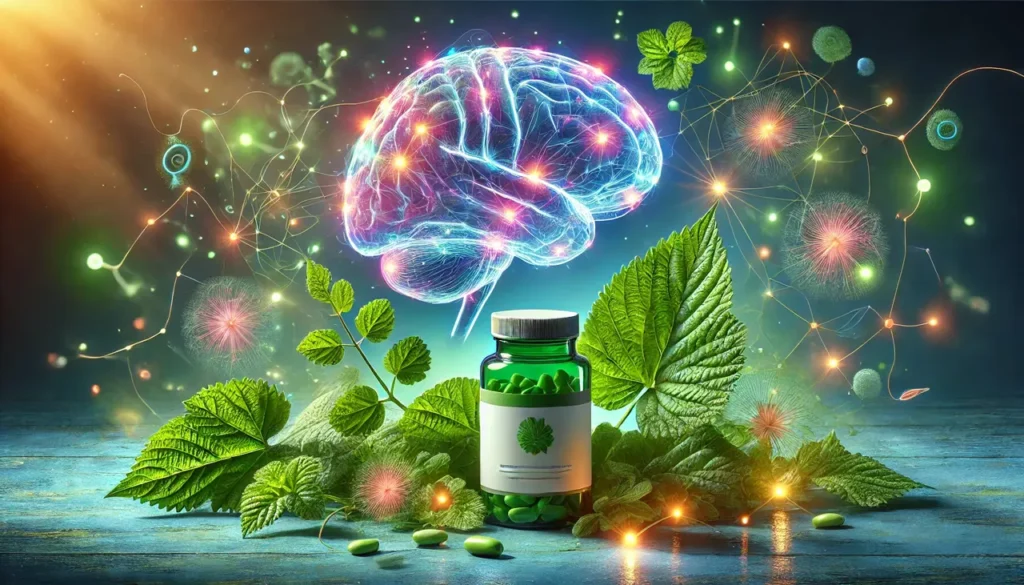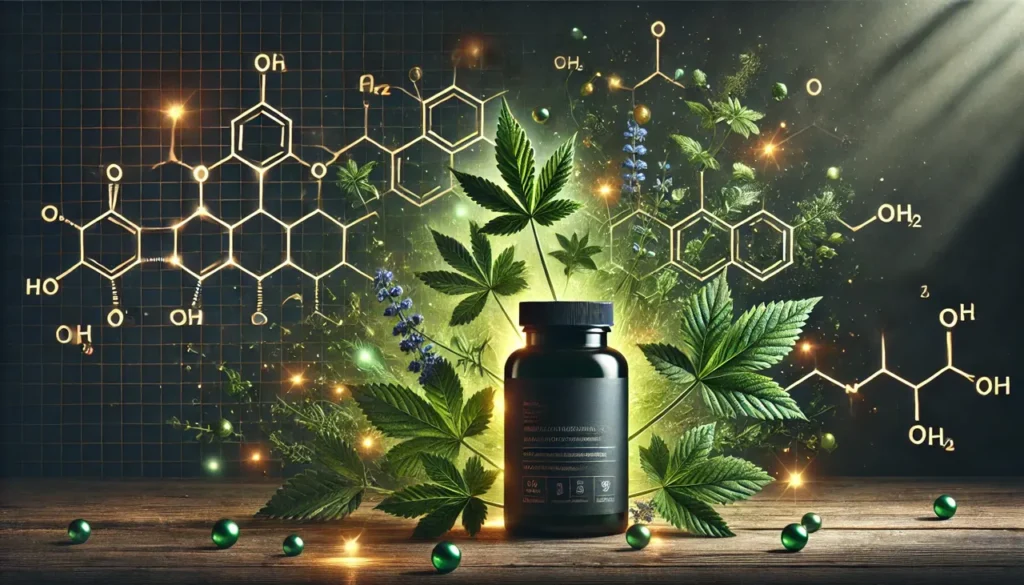Goutweed, scientifically known as Aegopodium podagraria, is a perennial herbaceous plant belonging to the Apiaceae family. Commonly found in various regions of Europe, Asia, and North America, it is often regarded as a weed due to its rapid growth and invasive nature. Historically, goutweed has been used in traditional medicine for its purported health benefits, including anti-inflammatory, analgesic, and diuretic properties. Recently, there has been an emerging interest in goutweed as a potential nootropic supplement, sparking curiosity about its cognitive-enhancing abilities. This article delves into the chemistry, physiological mechanisms, potential nootropic benefits, dosing guidelines, side effects, drug interactions, and other essential considerations regarding the safe use of goutweed as a nootropic supplement.
Sources of Goutweed
Goutweed is primarily found in moist, shaded areas such as woodlands, riverbanks, and disturbed sites. This hardy plant can be recognized by its distinctive three-parted leaves and small white flowers. While often considered a nuisance in gardens, goutweed has been utilized for culinary and medicinal purposes.
Culinary Uses
Goutweed’s young leaves and shoots are edible and can be used in salads, soups, and stews. They possess a slightly tangy flavor reminiscent of parsley. Despite its common name, goutweed is not typically used in mainstream culinary practices, but it has gained attention in foraging communities and among herbal enthusiasts.
Traditional Medicinal Uses
Traditionally, goutweed has been employed for various health conditions, particularly for alleviating symptoms associated with gout, arthritis, and inflammation. Historical applications often involved infusions or extracts made from its leaves and roots. Additionally, goutweed has been explored for its diuretic effects, potentially aiding in the excretion of excess uric acid.
Energize Your Body and Boost Brain Health with Potassium Supplements—Order Now on Amazon!

Chemistry of Goutweed
The active constituents of goutweed are primarily flavonoids, phenolic compounds, and essential oils. Notably, apigenin, luteolin, and quercetin are prominent flavonoids identified in goutweed, each contributing to its biological activity.
Flavonoids
Flavonoids are a class of polyphenolic compounds known for their antioxidant, anti-inflammatory, and neuroprotective properties. In goutweed, these flavonoids play a crucial role in mediating its physiological effects:
- Apigenin: This flavonoid exhibits neuroprotective effects by modulating neurotransmitter systems, particularly GABA (gamma-aminobutyric acid), which may contribute to its anxiolytic and sedative properties.
- Luteolin: Known for its anti-inflammatory and antioxidant effects, luteolin may help reduce oxidative stress in the brain, thereby supporting cognitive health.
- Quercetin: This compound is recognized for its ability to inhibit pro-inflammatory cytokines and improve endothelial function, which could have implications for brain health and vascular integrity.
Essential Oils
Goutweed also contains essential oils that contribute to its aromatic properties and potential therapeutic effects. These oils may exhibit antimicrobial and anti-inflammatory properties, further supporting goutweed’s traditional use in herbal medicine.

Physiological Mechanisms of Goutweed in the Body and Brain
Goutweed’s active constituents exert their effects through various physiological mechanisms, particularly in relation to inflammation, oxidative stress, and neurotransmitter modulation.
Anti-Inflammatory Effects
Chronic inflammation is a key factor in numerous cognitive disorders and neurodegenerative diseases. Goutweed’s flavonoids, particularly luteolin and quercetin, have been shown to inhibit the production of pro-inflammatory cytokines and enzymes, such as cyclooxygenase-2 (COX-2). By reducing inflammation, goutweed may protect against neuroinflammation, a significant contributor to cognitive decline.
Antioxidant Properties
Oxidative stress results from an imbalance between reactive oxygen species (ROS) and the body’s antioxidant defenses. Goutweed’s flavonoids possess strong antioxidant activity, scavenging free radicals and enhancing the activity of endogenous antioxidants like glutathione. This protective effect is particularly crucial for the brain, which is highly susceptible to oxidative damage due to its high oxygen consumption and lipid-rich composition.
Neurotransmitter Modulation
Goutweed’s active components may influence neurotransmitter systems, particularly GABA and serotonin. Apigenin, for example, has been shown to enhance GABAergic transmission, potentially leading to anxiolytic effects and improved cognitive performance. Additionally, the modulation of serotonin pathways may have implications for mood regulation and overall cognitive function.

Nootropic Benefits of Goutweed
The interest in goutweed as a nootropic stems from its multifaceted actions on cognitive health. While research is still in its infancy, several potential cognitive benefits have been identified:
- Enhanced Cognitive Function: Preliminary evidence suggests that the flavonoids in goutweed may support cognitive function by improving memory, attention, and learning capabilities. By modulating neurotransmitter systems and reducing neuroinflammation, goutweed could enhance overall cognitive performance. Additionally, compounds in goutweed may promote increased blood flow to the brain, further enhancing mental clarity and responsiveness. This makes goutweed an intriguing option for individuals looking to boost their cognitive abilities in various settings, from academic pursuits to everyday tasks.
- Mood Stabilization: Goutweed may play a role in mood regulation, particularly through its influence on serotonin and GABA levels. Improved mood stability can enhance cognitive performance, especially during challenging tasks requiring focus and attention. The potential for goutweed to act as a natural mood enhancer could be beneficial for those experiencing fluctuations in emotional well-being. By fostering a more balanced mood, individuals may find it easier to engage with complex problems and maintain motivation in their daily lives.
- Neuroprotection: The antioxidant and anti-inflammatory properties of goutweed contribute to its neuroprotective effects. By mitigating oxidative stress and neuroinflammation, goutweed may help slow cognitive decline associated with aging and neurodegenerative diseases. Research indicates that these protective properties may also support the health of glial cells, which are essential for maintaining neuronal integrity and function. As such, incorporating goutweed into one’s diet could be a proactive approach to preserving cognitive health over time.
- Stress Resilience: Goutweed’s potential to modulate neurotransmitter systems may enhance resilience to stress, improving cognitive performance under pressure. Enhanced stress management capabilities can lead to better decision-making and mental clarity in high-stress environments. By equipping the brain to handle stress more effectively, goutweed may allow individuals to maintain focus and creativity during demanding situations. This resilience can be especially valuable in professional settings, where the ability to perform under pressure is often critical to success.

Dosage and Supplementation Guidelines
While there is no established recommended dosage for goutweed as a nootropic supplement, general guidelines can be inferred from traditional uses and available research.
- General Dosage: For cognitive enhancement, doses of 200-500 mg of goutweed extract per day may provide beneficial effects without exceeding safety limits. These doses are commonly found in commercially available supplements.
- Forms of Supplementation: Goutweed is available in various forms, including dried herb, capsules, and tinctures. The choice of supplementation depends on personal preference and intended use. Tinctures may provide a more concentrated form, while dried herbs can be used in teas or culinary applications.
- Combination with Other Nootropics: Goutweed may be safely combined with other nootropic supplements, such as Ginkgo biloba or Bacopa monnieri, to enhance cognitive function synergistically. However, individuals should consult a healthcare professional before combining supplements to ensure safety and efficacy.
Achieve Optimal Brain Health with Amazon’s Top Picks for Nootropic Supplements—Explore Here!

Side Effects and Safety
Goutweed is generally considered safe for most individuals when used appropriately. However, potential side effects and precautions should be noted:
- Gastrointestinal Disturbances: Some individuals may experience mild gastrointestinal discomfort, including nausea, diarrhea, or abdominal pain when consuming high doses of goutweed. Starting with a lower dose and gradually increasing may help mitigate these effects.
- Allergic Reactions: Although rare, allergic reactions to goutweed can occur. Individuals with known sensitivities to plants in the Apiaceae family (e.g., parsley, celery) should exercise caution and consult a healthcare provider before use.
- Pregnancy and Lactation: The safety of goutweed during pregnancy and lactation has not been thoroughly studied. Therefore, pregnant or breastfeeding women should avoid using goutweed supplements unless advised by a healthcare professional.
Interactions with Other Supplements and Medications
Understanding potential interactions between goutweed and other supplements or medications is crucial for safe use.
- Anticoagulants: Goutweed may have mild anticoagulant effects due to its anti-inflammatory properties. Individuals taking blood-thinning medications (e.g., warfarin) should consult their healthcare provider to assess the risk of increased bleeding.
- Antidepressants: Goutweed’s influence on serotonin levels may interact with selective serotonin reuptake inhibitors (SSRIs) or other antidepressants, potentially enhancing their effects. Monitoring for increased side effects is advisable.
- Anti-inflammatory Medications: Combining goutweed with nonsteroidal anti-inflammatory drugs (NSAIDs) could enhance anti-inflammatory effects. However, individuals should discuss this combination with their healthcare provider to avoid potential complications.
Risks for Individuals with Certain Health Conditions
While goutweed is generally safe, individuals with specific health conditions should exercise caution.
- Bleeding Disorders: Individuals with bleeding disorders or those on anticoagulant therapy should avoid goutweed due to its potential to affect blood clotting.
- Liver Conditions: Given that goutweed is metabolized in the liver, individuals with liver disease should consult a healthcare professional before using this supplement, as impaired liver function may alter its metabolism.
- Hormonal Sensitivity: Goutweed may have estrogenic effects due to its flavonoid content. Individuals with hormone-sensitive conditions, such as certain cancers, should discuss the use of goutweed with their healthcare provider.
Experience Enhanced Mood with Amazon’s Best Stress Relief Supplements—Shop Now!

Conclusion: Should You Consider Goutweed as a Nootropic?
Goutweed’s rich profile of flavonoids, anti-inflammatory compounds, and antioxidants positions it as a potential nootropic supplement for enhancing cognitive function, stabilizing mood, and providing neuroprotection. While the current research on goutweed as a nootropic is still emerging, its historical use in traditional medicine and promising findings warrant further exploration.
Individuals interested in using goutweed as a nootropic should consult a healthcare professional to determine appropriate dosages and ensure safe usage, especially if they have pre-existing health conditions or are taking other medications. With careful consideration and responsible supplementation, goutweed may offer a natural means to support cognitive health and enhance mental performance.

References:
- Goutweed. Retrieved from: https://www.rxlist.com/supplements/goutweed.htm
- Bioactive Compounds in Aegopodium podagraria Leaf Extracts and Their Effects against Fluoride-Modulated Oxidative Stress in the THP-1 Cell Line. Retrieved from: https://pmc.ncbi.nlm.nih.gov/articles/PMC8704125/
- The influence of goutweed (Aegopodium podagraria L.) tincture and metformin on the carbohydrate and lipid metabolism in dexamethasone-treated rats . Retrieved from: https://bmccomplementmedtherapies.biomedcentral.com/articles/10.1186/s12906-016-1221-y
Important Note: The information contained in this article is for general informational purposes only, and should not be construed as health or medical advice, nor is it intended to diagnose, prevent, treat, or cure any disease or health condition. Before embarking on any diet, fitness regimen, or program of nutritional supplementation, it is advisable to consult your healthcare professional in order to determine its safety and probable efficacy in terms of your individual state of health.
Regarding Nutritional Supplements Or Other Non-Prescription Health Products: If any nutritional supplements or other non-prescription health products are mentioned in the foregoing article, any claims or statements made about them have not been evaluated by the U.S. Food and Drug Administration, and such nutritional supplements or other health products are not intended to diagnose, treat, cure, or prevent any disease.


